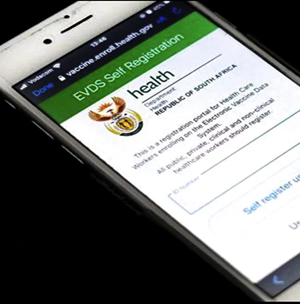Access to EVDS Health Data Significant for Evaluating Vaccine Efficacy
 Cape Town | On 6 December, the South African Medical Research Council (SAMRC) issued a press release about access to data from the Electronic Vaccination Data System (EVDS) to its researchers. The SAMRC has consulted with the National Department of Health (NDoH) and met with key players to design a safe way to share appropriate data within the prescripts of the POPIA.
Cape Town | On 6 December, the South African Medical Research Council (SAMRC) issued a press release about access to data from the Electronic Vaccination Data System (EVDS) to its researchers. The SAMRC has consulted with the National Department of Health (NDoH) and met with key players to design a safe way to share appropriate data within the prescripts of the POPIA.
The data is needed to evaluate efficacy of vaccines, which has become significant in the context of Omicron. It is important for researchers to have access to information about who has received the vaccine so that we can link this with the data that we have on breakthrough infections and deaths.
“If we are able to put the data together, we can get a picture of how well the vaccines work - which is particularly important in the context of a new variant,” says Prof Debbie Bradshaw a Chief Specialist Scientist at the SAMRC.
“The SAMRC will work with the Western Cape Department of Health to utilize this data for research purposes and for nothing else, researchers evaluating this data will be an extension of the NDoH team,” confirmed Prof Glenda Gray, SAMRC President and CEO. NDoH will continue to work with the National Institute for Communicable Diseases on breakthrough infections shared through their dashboard, added Gray.
The NDoH is the owner of the Electronic Vaccination Data System (EVDS). This system has been designed as the central registry of all Vaccination Events and Matrices. NDoH is therefore responsible for ensuring that appropriate data protection and governance policies are applied to comply with legislative requirements and to monitor legitimate, appropriate, and proportionate use and processing of the EVDS data.
The data set contains among other data sensitive personal medical information which is subject to the POPIA. The EVDS Privacy Policy, that everyone who registers for COVID-19 Vaccination consents to, guarantees that the data will not be used for any other purpose than personal vaccination medical records. The challenge has been on how to use the bio identity in the data to correlate with data on hospitalisation and deaths without exposing the personal data to potential abuse. NDoH will use this data and work with other identified government agencies by combining the analytics teams to conduct the required analytics within the realm of confidentiality and the protection of personal data requirements and not distributing or sharing any personal identifiable data with any other parties.
We appreciate the support from the NDoH, health data is important in research to better understand diseases and improve health care decisions and delivery, said Gray.
NOTE TO THE EDITOR:
The SAMRC’s Burden of Disease Research Unit collects and analyses data on South Africa’s health status to estimate and monitor the burden of disease, the impact of health problems, and factors associated with the health of the population.
The Unit publishes Reports on Weekly Deaths in South Africa on its website.
Contact Details
Tendani Tsedu
Head of Corporate & Marketing Communication
Email: tendani.tsedu@mrc.ac.za

